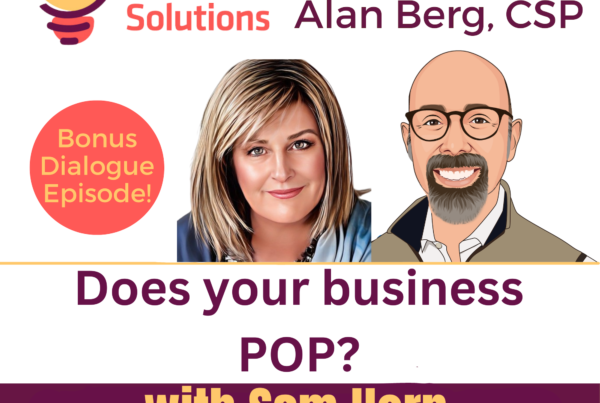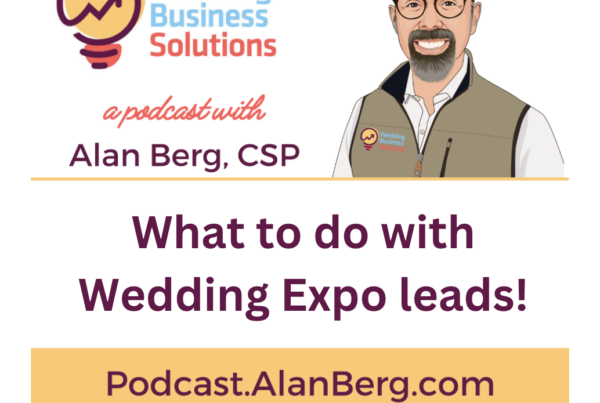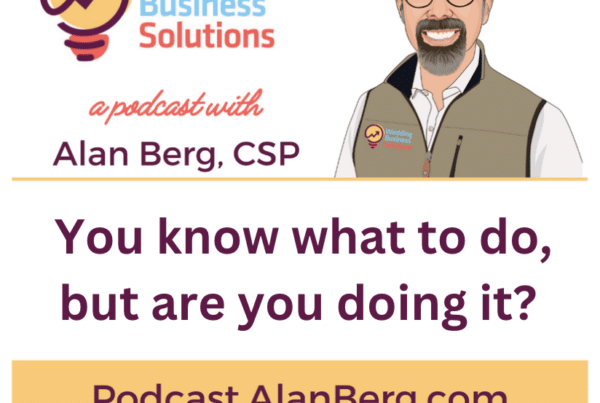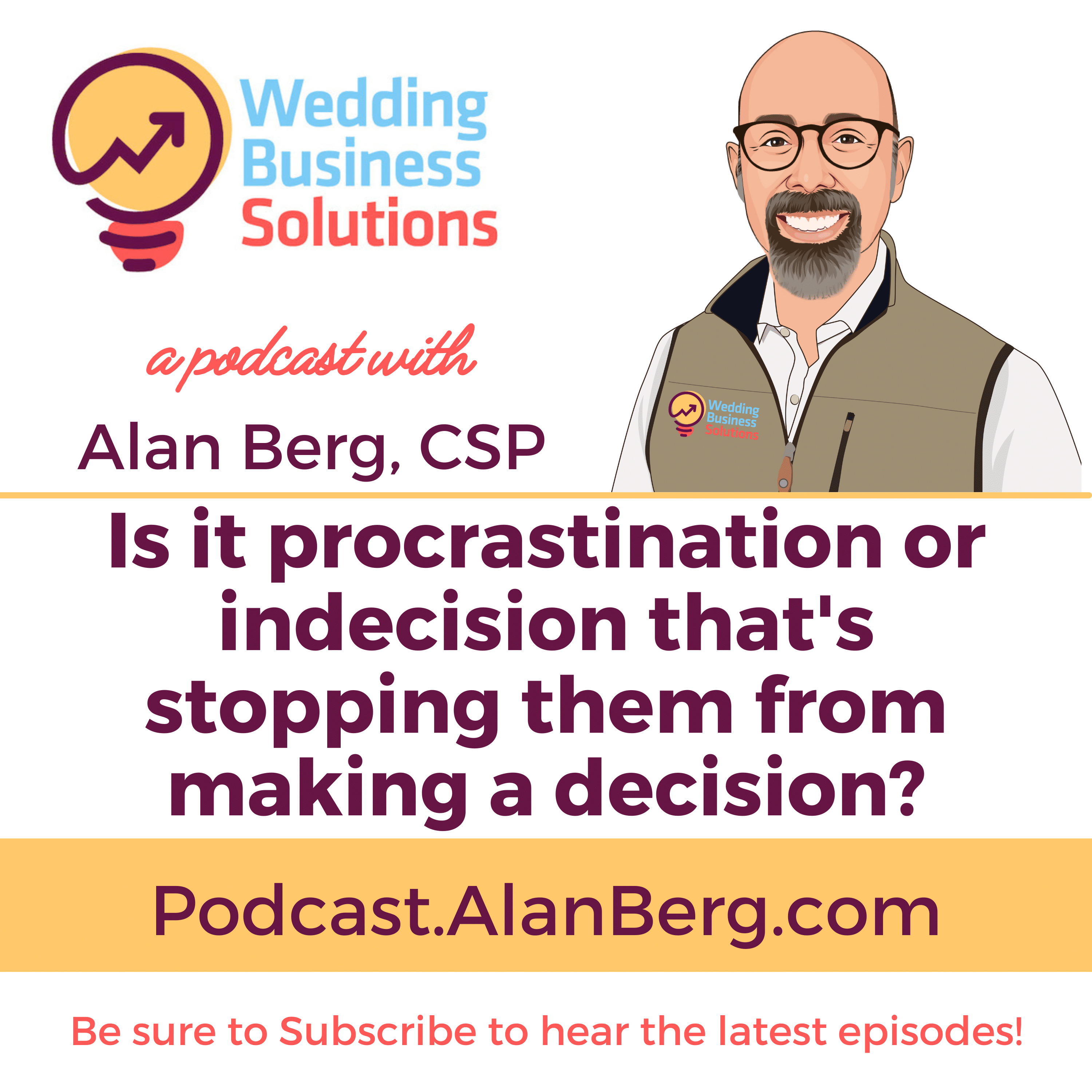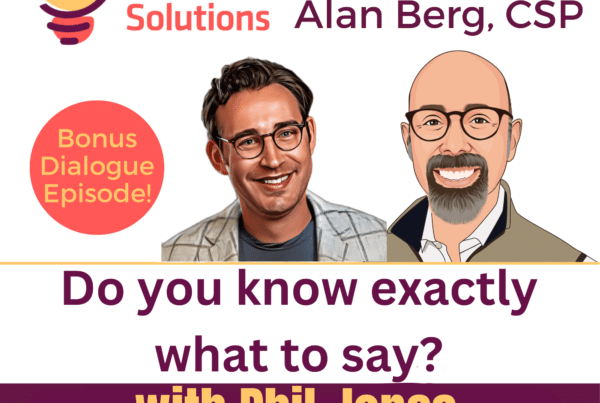 Is it procrastination or indecision that’s stopping them from making a decision?
Is it procrastination or indecision that’s stopping them from making a decision?
I just finished reading (listening) to a great book, for the second time, called “The JOLT Effect”. It’s from the same authors as “The Challenger Sale”, a book I’ve mentioned here before on the podcast. They bring up a very interesting concept that oftentimes, they’re convinced that you’re a good fit for them and their needs, yet they still say No. It could be indecision that’s holding them back and you might be making it worse for them by how you’re handling it.
Listen to this new, 9-minute episode to see how you can identify their indecision and help them move forward, rather than having them rethink it when they already liked you!
Listen to this and all episodes on Apple Podcast, YouTube or your favorite app/site:
- Apple Podcast: http://bit.ly/weddingbusinesssolutions
- YouTube: www.WeddingBusinessSolutionsPodcast.tv
- Spotify: https://spoti.fi/3sGsuB8
- Stitcher: http://bit.ly/wbsstitcher
- Google Podcast: http://bit.ly/wbsgoogle
- iHeart Radio: https://ihr.fm/31C9Mic
- Pandora: http://bit.ly/wbspandora
Below is a full transcript. If you have any questions about anything in this, or any of my podcasts, or have a suggestion for a topic or guest, please reach out directly to me at [email protected] or contact me via text, use the short form on this page, or call 732.422.6362
Please be sure to subscribe to this podcast and leave a review (thanks, it really does make a difference). If you want to get notifications of new episodes and upcoming workshops and webinars, you can sign up at www.ConnectWithAlanBerg.com
Is it procrastination or indecision that’s stopping them from making a decision?
Listen to this episode, find out what I’m talking about. Hi, it’s Alan Berg, Welcome back to another episode of the “Wedding Business Solutions Podcast”.
I am now listening to an audiobook called “The JOLT Effect”, J-O-L-T, “The Jolt Effect” for the second time. It’s by Matthew Dixon and Ted McKenna. The same people that wrote “The Challenger Sale”, another book that I’ve spoken about. I might’ve spoken about it on the podcast, I’ve definitely spoken about it from the stage. And it’s really interesting because what they’re talking about is indecision.
And indecision, not the same thing as procrastination. Like somebody’s putting off a decision. They might already be sold on the fact that you are a good fit and you can provide good results but they’re still not pulling the trigger. They’re still not saying yes or not moving forward with it. And they talk about how there are different reasons why somebody could be putting this off, right?
Three kinds of indecision. They’re worried about choosing the wrong option, okay? So you have different options there and that could be your own fault for presenting them with too many options and now they’re just not sure. They want to go with you but they just can’t decide.
They’re concerned they haven’t done enough homework. And these are people that every new piece of information is just distracting them and they’re like, well, maybe I need to read another review. Maybe I need to talk to another customer as a referral or something.
Or number three, they fear they won’t get what they’re paying for. That they like you, but even though they’ve read everything and they think everything is great, they’re still not sure they’re going to get the kind of results that they’re paying for. So when someone’s not deciding, there are things that we are doing that are causing the problem and there are things that, you know, are on their end.
You know, this decision paralysis that I’ve spoken about another great book, “The Paradox of Choice” where people can’t decide because there’s too many choices. You know, in the beginning they want to know that they have a lot of choices, and that’s okay. You want them to come to you and say, listen, we have a lot of choices. But if you’re not narrowing that down, you’re making it harder for them. You’re making it harder for them to decide because there’s still too many choices. And I’ve spoken about this before. It’s our job to reduce their choices, not increase their choices. But what was interesting is in the book, they talk about how the fear of missing out, FOMO, the fear of missing out, that works up to a point. But then once they’re already sold on you, it could work against you.
So the three things they say that salespeople go back to are, they call it FUD, fear, uncertainty, and doubt, right? The fear of missing out. If you don’t do this, you know, you’re not going to get the results you want. The uncertainty and the doubt.
And then also putting in, like, deadlines. You know, this is especially you have to do it now, that actually can work against you with people who are indecisive. So if there’s a deadline, it doesn’t make some, those people, it doesn’t make them move. It actually freezes them and then they still can’t decide, right? because they’re still not sure if they’re making the right decision, if they’re going to get the results they want at all.
So if you’re a reader or reader of business books, I highly recommend “The JOLT Effect”. Matthew Dixon and Ted McKenna. If you haven’t read “The Challenger Sale”, I recommend that as well. And the key here is to just understand with your customer are they just not sold yet? They’re not sold on the fact that you’re the right fit or are they just being indecisive and can you move them forward?
And that’s what the JOLT Effect is. It’s an acronym, J-O-L-T. So you’re judging their indecision, you’re offering your recommendation, you’re limiting the exploration of other choices, and you’re taking risk off the table if that’s something that you can do. So sometimes, and I’ve used this kind of metaphor that in the sales process here for weddings and events where people haven’t done this before, it’s kind of like you’re the shepherd and they’re the sheep. They’re looking for your guidance. And sometimes, the best thing to do is to say, you know, it sounds like you’re not sure between these options. If I was you, I would go with this. Or you can’t go wrong with going with this one. It’s going to give you what you have over here. Or, and I had this conversation with one of my clients today, an entertainment company, maybe the thing to do is to say: “Listen, why don’t you just go with this package here or this service here. We have months or a year until your event. You can always add to it, you can always change things, but let’s get us reserved so that you know that we’re going to be providing you with the great results. And as far as those features, we can figure that out later.” And don’t blow the big sale. If you can get a smaller one today, that’s satisfactory for you.
Again, if it’s one of your busiest days of the year, you don’t have to take a tiny sale for that day. But if it’s an acceptable package, don’t try to push them necessarily to the big one if they’re not making a decision at all and then upsell them later. Now again, I think you should be trying to sell from the top down, selling them the big package, but if they can’t decide, maybe stepping it down gets them to say yes and then coming back to them later, they might decide, yeah, we do want those other features. We do want those other things. So, you know, something to think about with this is indecision versus procrastination. Just, you know, pushing, kicking the can down the road.
The people that are indecisive that you have the biggest opportunity are the ones that they’re sold on you, they want you, but they’re not pulling the trigger because of whatever it is that is holding them back that they’re not sure that it’s going to get the results. So maybe go with this package instead of this other package.
They also talk about errors of omission versus errors of commission. And an error of omission, probably heard that phrase before, is you don’t get the result because you didn’t do that thing. So they use the example of if you, you know, don’t go with this particular whatever it is and your company doesn’t make X dollars, it’s hard to put your finger on that because how do you quantify what you didn’t get as opposed to an error of commission where your actions have caused the thing to happen.
So you decide to go a certain way. Let’s say you decide to up your ad on a website, like you decide to up your ad on The Knot or on Instagram or whatever, and you bring in more leads and it turns into more business. That’s a commission. You did that.
But if you do that, do something, and it doesn’t work for you, right? Like I had some clients they’re throwing some money at TikTok or whatever and it’s not working for them, you feel the pain because you’re not getting the return and that was your fault because you made that decision. That’s an error of commission. And there’s a difference between those type things and how to sell someone who’s afraid of one versus the other. You know, in a business to business thing, it’s a little bit more where, you know, do you want to be held accountable to your boss for the decision you made that lost the company money versus we decided not to do that so we didn’t profit, which is again, harder to put your finger on because there’s so many things that could’ve led to that as opposed to having your signature on that.
I decided therefore it’s up to me. So some of this indecision is people it’s this, they’re fearing the error of commission, which is my actions will lead to a negative result or not the best result that I want. And that’s an indecision, right? They’re still sold on you, but they just don’t want to sign because they don’t want to be held responsible for the decision. So saying to people, you know what, if I was you, I would go with this lets them off the hook a little bit. Or hey, if you don’t get the results you want, you can blame me because I think this is the right thing for you. So interesting book. Again, if you’re a reader, I highly recommend it. I’m listening to it for the second time because, you know, when I’m driving, I’m listening, so I don’t hear it all. And we also don’t remember everything we hear anyway. So I’m listening to it immediately after I finished a second time through finding other things, taking notes, hoping to share more of that in presentations.
But you know, is it indecision or procrastination is a very interesting little kind of semantic thing, but can make a really big difference in you helping get people over the hump from they’re almost all the way there but you can’t get them to say yes to that little thing that might take them to the next thing. So I hope this little bit helps you and if you do read the book, let me know how you like it. Thanks.
I’m Alan Berg. Thanks for listening. If you have any questions about this or if you’d like to suggest other topics for “The Wedding Business Solutions Podcast” please let me know. My email is [email protected]. Look forward to seeing you on the next episode. Thanks.
©2023 Wedding Business Solutions LLC & AlanBerg.com
